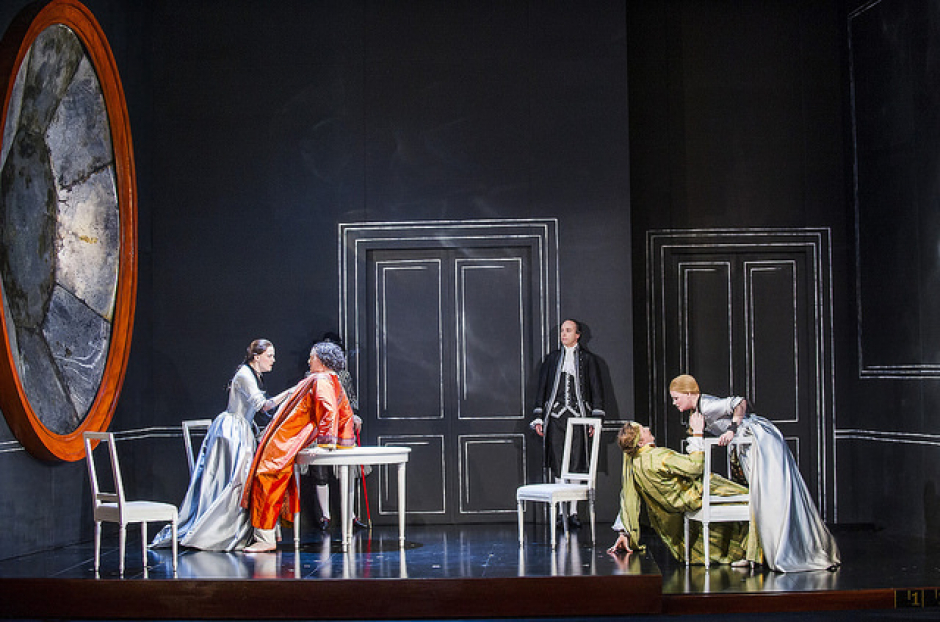Così fan tutte, The Lowry, Salford Quays, 16–18 March 2016
Così fan tutte – the politically incorrect title translated variously as ‘Women Are Like That’, ‘They’re All the Same’, or the preferable, ‘The School for Lovers’ – is an Italian opera composed by Mozart in 1790 to a libretto by Lorenzo da Ponte. Commissioned by the Austrian Emperor Joseph II – considered one of the three great Enlightenment monarchs – Così fan tutte reflects the ideas of the Age of Enlightenment, described by Immanuel Kant as ‘man’s release from his self-inflicted immaturity’, and, according to this opera, his naïve faith in the ideals of romantic love, particularly the fidelity of women. (A theme similarly explored in 1744’s La dispute by Pierre de Marivaux, but without the gender bias of Così – an extract of which is presented in Opera North’s highly informative programme.)
In this production, Opera North successfully reflect the Enlightenment backdrop through various devices. The action is set within a large construction of a wooden camera obscura. First onto the stage is the philosopher, Don Alfonso, who, hovering outside the camera obscura as he introduces the opera, will attempt to support his hypothesis that constancy and fidelity in romantic love are fallacious beliefs, through a cruel experiment on two young couples engaged to be married. Into the camera obscura, Don Alfonso projects the romantic ideals of the two young fiancés, Ferrando and Guglielmo, who, confident that their loves will remain faithful if tested, agree to a wager with Alfonso. Their ideals are soon turned upside down.
Barefooted and wearing colourful Ottoman clothing – which the women too gradually reveal as undergarments as they give in to the seduction – Ferrando and Guglielmo, having faked their departure to fight in an unnamed war, re-enter the scene disguised as two foreign suitors. What ensues is an emotional journey for the two women, Fiordiligi and Dorabella, set to Mozart’s lively, light-hearted yet dramatic score as the conflicted women find themselves torn between desire and guilt.
Enter Despina – the maid and Don Alfonso’s ‘lab assistant’ – to ‘reason’ with the women, encouraging them to treat the dalliance as a harmless diversion while they await their fiancés’ return. Ellie Laugharne shows great charisma in the role of Despina, who also disguises herself as a doctor to treat the two suicidal suitors, whose advances are initially rebuffed, and later a lawyer to marry the couples, or perhaps not. Playing a somewhat resentful maid whose dissatisfactions are made known from the beginning – reflecting the burgeoning French Revolution at the time – she also effectively plays the role of the Italian doctor, whose occasional use of faulty Latin reflects the Enlightenment writers who had begun translating inaccessible scientific documents into the vernacular.
Maire Flavin and Helan Sherman were wonderful as the two female protagonists, whose voices were able to carry the emotional intensity and fluctuations of Mozart’s musical score, while avoiding marionette-style depictions of their characters as each battles their moral conscience. They also showed great comedic ability in their physicality and delivery of their lines. William Dazeley and Gavan Ring, who played Ferrando and Guglielmo, also sang beautifully, but their characters were perhaps underplayed and the production would have benefitted from stronger acting to do justice to the wit and humour of the libretto.
At three hours in length, Opera North’s Così fan tutte sometimes felt over-long, primarily when it was difficult to follow the dialogue in some of the longer scenes, the contents of which often had to be inferred from the emotional expressions of the music. However, I greatly appreciated Opera North’s thought-provoking interpretation of the dramatic conflict between science, reason and the human heart.
Emma Rhys

